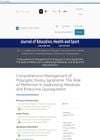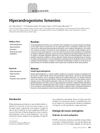September 2002 in “Fertility and sterility” Metformin can start ovulation and may lower 17P response in PCOS, but six months is too short to improve hair growth or change body fat distribution.
 January 2025 in “Journal of Education Health and Sport”
January 2025 in “Journal of Education Health and Sport” Metformin helps manage PCOS by improving metabolism and ovulation, but should be part of a personalized treatment plan.
 74 citations,
January 2006 in “Endocrine journal”
74 citations,
January 2006 in “Endocrine journal” Low-dose gonadotropin treatment is effective for infertility in women with PCOS, leading to high ovulation rates and comparable pregnancy rates with fewer complications.
[object Object]  47 citations,
August 2000 in “Endocrine Reviews”
47 citations,
August 2000 in “Endocrine Reviews” The document concludes that more research is needed to understand excessive hair growth in women with normal hormone levels and regular ovulation.
 10 citations,
June 2006 in “Fertility and Sterility”
10 citations,
June 2006 in “Fertility and Sterility” The conclusion is that metformin is a first-line treatment for PCOS, particularly for restoring ovulation and increasing pregnancy rates, with other treatments depending on specific symptoms.
 October 2020 in “Medicine - Programa De Formación Médica Continuada Acreditado”
October 2020 in “Medicine - Programa De Formación Médica Continuada Acreditado” Female hyperandrogenism is a condition caused by too much male hormones, leading to skin issues and ovulation problems, often due to Polycystic Ovary Syndrome, and is treated based on individual symptoms.
 June 2019 in “The Medical journal of Basrah University”
June 2019 in “The Medical journal of Basrah University” Laparoscopic ovarian drilling helps infertile women with PCOS by improving menstrual regularity, ovulation, and chances of conception, and by changing hormone levels.
 45 citations,
November 2021 in “Fertility and Sterility”
45 citations,
November 2021 in “Fertility and Sterility” The conclusion is that women under 35 should start fertility checks after 12 months of trying to conceive, women over 35 after 6 months, and women over 40 should start immediately. The checks should include ovulation status, reproductive tract structure, and male partner's semen evaluation.
 19 citations,
October 2004 in “Best Practice & Research in Clinical Obstetrics & Gynaecology”
19 citations,
October 2004 in “Best Practice & Research in Clinical Obstetrics & Gynaecology” The diagnosis of polycystic ovary syndrome (PCOS) requires a detailed patient history, ultrasound scanning, hormone level checks, and assessments of ovulation, obesity, and insulin resistance. It's a variable condition that needs individualized management and is a significant risk factor for type 2 diabetes.
[object Object]  July 2019 in “International journal of reproduction, contraception, obstetrics and gynecology”
July 2019 in “International journal of reproduction, contraception, obstetrics and gynecology” Obesity greatly affects polycystic ovarian syndrome, and losing weight should be the first treatment for obese patients to improve their chances of ovulation and pregnancy.
 135 citations,
April 2017 in “Advances in Clinical and Experimental Medicine”
135 citations,
April 2017 in “Advances in Clinical and Experimental Medicine” New treatments for PCOS show promise, including both medication and non-medication options.
 41 citations,
March 2007 in “Steroids”
41 citations,
March 2007 in “Steroids” New methods to make oxasteroids show promise for medical treatments like osteoporosis and breast cancer.
 39 citations,
September 2000 in “Obstetrics and Gynecology Clinics of North America”
39 citations,
September 2000 in “Obstetrics and Gynecology Clinics of North America” Insulin-lowering medications show promise for PCOS symptoms but can't be the main treatment yet due to limited long-term research.
 38 citations,
June 2004 in “Human Reproduction”
38 citations,
June 2004 in “Human Reproduction” The document suggests that clinical trials for PCOS should focus on meaningful primary outcomes like live birth rates, rather than less reliable surrogate markers.
 38 citations,
October 2006 in “Fertility and Sterility”
38 citations,
October 2006 in “Fertility and Sterility” The document concludes that identifying the cause of amenorrhea is crucial for proper treatment.
 31 citations,
September 2006 in “International journal of gynaecology and obstetrics”
31 citations,
September 2006 in “International journal of gynaecology and obstetrics” New treatments for PCOS focus on insulin resistance and reducing testosterone levels, along with traditional hormone therapies.
26 citations,
January 2016 in “Indian journal of endocrinology and metabolism” Both metformin and pioglitazone improve PCOS symptoms, but pioglitazone is a good alternative for those who can't take metformin.
 11 citations,
August 2018 in “Endokrynologia Polska”
11 citations,
August 2018 in “Endokrynologia Polska” Polish medical societies recommend personalized treatment for PCOS based on the patient's specific symptoms and use the Rotterdam criteria for diagnosis.
 7 citations,
August 2017 in “European Journal of Obstetrics & Gynecology and Reproductive Biology”
7 citations,
August 2017 in “European Journal of Obstetrics & Gynecology and Reproductive Biology” Lower vaspin levels in the blood may indicate a better response to fertility treatment in women with PCOS.
 6 citations,
August 2023 in “Fertility and Sterility”
6 citations,
August 2023 in “Fertility and Sterility” The 2023 guideline for PCOS suggests using updated diagnostic criteria, assessing related health risks, and recommends lifestyle changes and specific treatments for symptoms and fertility issues.
5 citations,
January 2020 in “Research journal of pharmacy and technology” CBD may help reduce stress and pain in women with PCOS.
 5 citations,
October 2012 in “Journal of Midwifery & Women's Health”
5 citations,
October 2012 in “Journal of Midwifery & Women's Health” Healthcare providers should start with simple fertility tests and treatments before referring patients to specialists.
 4 citations,
February 2011 in “Nature Reviews Endocrinology”
4 citations,
February 2011 in “Nature Reviews Endocrinology” Metformin and thiazolidinediones are similarly effective for PCOS, but metformin is often preferred due to fewer side effects.
 1 citations,
January 2017 in “International journal of women's health and reproduction sciences”
1 citations,
January 2017 in “International journal of women's health and reproduction sciences” Electroacupuncture improved symptoms of PCOS in a 19-year-old woman.
 1 citations,
February 2017 in “Journal of gynecology and womens health”
1 citations,
February 2017 in “Journal of gynecology and womens health” The document concluded that more research is needed to understand how estrogen affects the enzyme involved in hirsutism development.
1 citations,
March 2005 in “SKINmed/Skinmed” Oral contraceptives can help treat skin issues like acne and excess hair.
 August 2024 in “Quality in Sport”
August 2024 in “Quality in Sport” Lifestyle changes like diet and exercise are crucial for managing PCOS.
 June 2024 in “IntechOpen eBooks”
June 2024 in “IntechOpen eBooks” Myo-inositol-based treatments greatly improve pregnancy chances for women with PCOS.
 March 2023 in “East African scholars journal of medical sciences”
March 2023 in “East African scholars journal of medical sciences” Metformin may help regulate periods and cause modest weight loss in PCOS patients, but more research is needed.
 October 2022 in “Aesthetic Cosmetology and Medicine”
October 2022 in “Aesthetic Cosmetology and Medicine” PCOS often causes skin problems due to hormonal and metabolic imbalances.

























